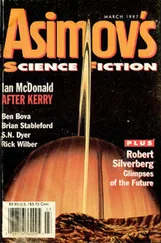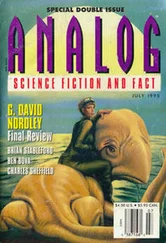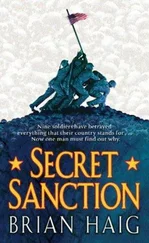We trudged on across the desolate landscape. Everything showed white in the light of our torches. The territory was sectioned with geometrical precision, broken up into diamonds and rectangles, with the pillars holding up the roof sprouting at each corner. We were walking along the walls that had once separated the sections, where there had once been carpets or lakes of artificial photosynthetic, electrosynthetic and thermosynthetic substances. Now there were only empty holes. The cavies had wrapped up their fields and drained their reservoirs, and taken it all with them when they had set forth on their exodus into the interior.
This entire system had once been a self-sustaining ecological unit: a complete, functioning ecosphere. Now it was dead, like the surface of a world that had passed through a cosmic catastrophe or a nuclear holocaust. It was a ghost-world, utterly abandoned. But had its people simply removed themselves to some other closed ecosphere, a hundred metres, or a hundred thousand metres, beneath our feet? I tried to imagine the queue that might have formed at the elevator, and remembered old jokes about standing on one spot while the entire population of China passed by in a line… a line which could never end, because new Chinamen were being born faster than the old ones could pass by.
The cavies, I presumed, didn’t have that kind of problem—a race that lived in a closed and sealed ecology must surely have been able to maintain population stability. But I couldn’t be sure. Maybe I had it the wrong way around. Maybe it was because the cavies didn’t have a stable population that they had to keep adding layer after layer to the surface of their world, to supply ever more living space. If that had been the case, once upon a time, then it was possible that the disaster that pulled them back from the outer levels was something that happened deep inside Asgard, and not the destruction of the outer atmosphere after all.
I tried to stop thinking about it by telling myself that when we got to the end of our expedition, we’d have much more evidence to go on, and that it was futile to speculate in the meantime. But I couldn’t stop. The closer I got to the answer, the more eagerly the question preyed upon my thoughts. I guess I became preoccupied.
Too preoccupied, as it turned out.
We came, as I had anticipated, to a floor-to-ceiling wall—a vast, long face that curved away in either direction as far as we could see. There was an open doorway in front of us, scored on either side by Saul Lyndrach and Myrlin: three mysterious hieroglyphs, two to the left and one to the right. The hole was just wide enough to steer a sled through.
I was in the lead, and my attention was split two ways. I looked back at my companions, then squinted at Saul’s marks, all the while teasing the tape with my tongue to bring it to the precise point at which any relevant comment would have been recorded.
All the while I was doing these things I was walking forward without pause, and I never saw the tripwire that was waiting for me in the darkness just beyond the doorway. I felt the impedance to my foot the moment I made contact, but by then it was too late.
I barely had time to look about in wild panic before something that seemed to my untutored eye to be the size of a small sun came hurtling out of the darkness toward my head.
Fools rush in, they say, where angels fear to tread.
I can elaborate on that, by observing that fools trip up where angels would still be on their feet. This isn’t necessarily a bad thing, because if there’s a flame-pistol pointed at the place where your face should be, you might be a damn sight safer tripping up.
A flame-pistol doesn’t actually fire a jet of flame. What it fires is some kind of semi-liquid artificial plastic which is desperately unstable, and which bursts spontaneously into flame without requiring an external supply of oxygen. Once ignited, it burns very quickly and exceedingly hot, so the person at whom the pistol has been fired is faced with a rapidly expanding cloud of gas. It pays, sometimes, to be close to such a weapon, because if you duck, it can still miss you. If you’re a bit further away, you have to dive much further to avoid it.
When I tripped over the piece of rope that Myrlin had left inside the doorway, I was just close enough. That miniature sun couldn’t have missed me by more than ten centimetres, but it hadn’t expanded enough to burn me. The electromagnetic radiation it gave off wasn’t enough to blast a hole in the heavy-duty suit I was wearing. By the time the second bolt was fired, I was flat on the floor and I was determined to stay there until it was all over.
The flame-pistol had obviously been set on automatic, because the second bolt was by no means the last. I lost count after five, but I think the damn thing spat out eight or ten bolts before it finally gave up. Even at that, the trigger must have slipped—a fully-loaded flame-pistol carries a lot of ammunition. I waited for well over a minute, not daring to move, before I finally lifted my head, and then I came tremulously to my feet.
I turned around, and looked back at the carnage behind me, half-expecting to be confronted with the scene of a massacre.
There were great gouting clouds of gas, smoke and vapour, and great glowing patches where the ledge along which we had come had suddenly been raised in temperature from a few degrees Kelvin to a few thousand. One of the sleds had been completely devastated—it had been turned into a pile of slag every bit as useless as those million-year-old cars we had passed on the highway. The other one had been too close to me—the bolts had gone clean over the top of it, without the radiation doing too much damage.
If the star-captain and her men had been close enough to me to have entered the tunnel-mouth, they would have been cooked, but natural caution had held them back. When the firing started they’d done exactly the right thing, making full use of their hair-trigger reflexes. They’d moved into the shadow of the solid wall, hurling themselves forward and sideways so that the bolts had passed harmlessly by, crouching well away from the explosive impacts which the expanding bolts had made on the body of the second sled, and hiding their eyes. They were lucky that they were wearing heavy-duty suits, not the light sterile suits Serne had described to me as their normal combat gear. Even so, I ordered an immediate set of tests, to make sure that the radiation hadn’t done any fatal damage.
“Rousseau,” said the star-captain icily, “you’re a moron.”
“Maybe so,” I said. I actually felt like a moron, for not expecting the tripwire, and not being properly alert to its presence. “But you ought to thank whatever god you have that he put the wire so close to the doorway. If we’d been thirty metres into a narrow corridor, you wouldn’t have had a cat in hell’s chance of avoiding those fireballs. You think he’s a moron too, or was that just a warning shot?”
“Can it, Rousseau,” she said, with all her customary charm. “Just tell us how much we lost, and how much it’s going to hurt our chances.”
I sighed.
“Well,” I said, “it’s certainly not going to help. It’s cost us most of our cutting equipment, and all of our bubbling gear. That means we’re going to have difficulties when we sleep. We’ll have to pitch hammocks in the open, and make damn sure that we don’t take a fall. The suits are sound, as far as the tests can tell, but the material’s not really intended to cope with a deluge of infrared and microwaves. It saved us from being cooked, but its future tolerance might be affected. We can go on, but all risks are doubled now. Next time… well, next time, whoever goes first had better not trigger the trap. That’s all there is to it.”
Читать дальше












